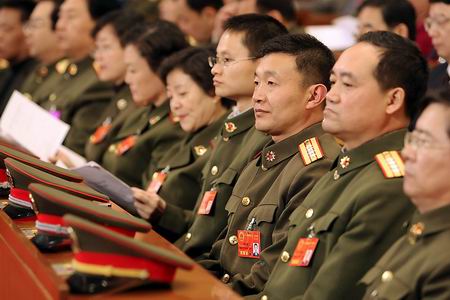
Deputies from the People¡¯s Liberation Army attend the
preparatory meeting of the first session of the 11th National People¡¯s Congress
in Beijing yesterday. A Chinese Foreign Ministry spokesman yesterday condemned
the annual Pentagon report to the US Congress on Chinese military power, saying
it was a contortion of the facts.¡ªXinhua
China plans to increase defense spending 17.6 percent this year to improve
the lot of its soldiers, offset rising oil prices and upgrade military
equipment.
The defense budget for 2008 is 417.769 billion yuan (about US$57.229
billion), a rise of 62.379 billion yuan from the actual military spending last
year, Jiang Enzhu, spokesman for the annual session of the National People's
Congress, told a press conference in Beijing yesterday.
"The ratio against this year's total fiscal spending is slightly lower than
in previous years," he said.
In addition to increased benefits for military personnel and higher oil
prices, more money will be spent on education and training in the army, Jiang
said.
The increased budget will also be used to upgrade military equipment
"moderately" to enhance the troops' ability to wage a defensive war based on
information technologies, he said.
Jiang called the defense budget growth a "compensatory" rise, saying it will
help reinforce the originally weak basis of military defense, given the rapid
and steady growth of China's economy and fiscal revenues in recent years.
From 1979 to 1989, China's defense spending fell an average of 5.83 percent a
year, and its growth in recent years is still far below the increase in fiscal
revenues, he said.
Military spending rose an average of 15.8 percent a year from 2003 to 2007,
while fiscal revenues grew 22.1 percent a year.
Luo Yuan, a researcher with the People's Liberation Army Military Academy of
Sciences, said China's army, in a critical "transitional" period, will naturally
spend more on high-tech equipment.
Luo said the United States' B-2 stealth bombers, brought under the media
spotlight after a recent crash, were reported to cost about US$1.2 billion each
to build.
China's major military equip-ment still lags behind that of developed
countries by "one or two generations."
"To shorten the gap, we have to increase input," said Luo, who is in Beijing
at the annual session of China's top political advisory body.
He said a budget rise will help realize the coordinated development of the
economy and national defense.
After entering the new century, armies all over the world have expanded their
functions. Chinese troops are also burdened with new tasks to contain
"unconventional security threats," he said.
"For example, China's military sent a large number of its soldiers and
officers as well as disaster relief materials to help with rescue work amid the
worst snow havoc in five decades in January," he said.
"Why can't we raise our defense budget while facing new tasks."
Luo also highlighted the influence of price rises, especially the surging oil
price. "The government has offered other sectors subsidies," he said, adding it
also needs to subsidize the army.
Jiang said China's military spending remains low compared with some other
countries, especially the big powers, in ratios against both gross domestic
product and total fiscal expenditure.
China's military spending last year accounted for only 1.4 percent of GDP,
compared with 4.6 percent in the US, three percent in Britain, two percent in
France, 2.63 percent in Russia and 2.5 percent in India.
China maintains limited military power only to secure its independence,
sovereignty and territorial integrity, and won't pose a threat to any country,
Jiang said.



